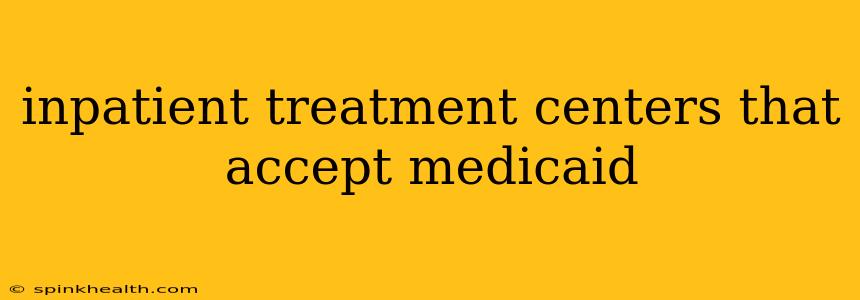Finding Inpatient Treatment Centers That Accept Medicaid: A Journey to Recovery
The decision to seek inpatient treatment for a substance use disorder or mental health condition is a significant one, often fraught with anxieties about cost and access to care. Navigating the complexities of insurance coverage, particularly Medicaid, can feel overwhelming. This article aims to guide you through the process of finding inpatient treatment centers that accept Medicaid, offering hope and support during a challenging time.
My name is Sarah, and I've worked in the addiction recovery field for over a decade. I've witnessed firsthand the transformative power of inpatient treatment, and I understand the crucial role insurance plays in making it accessible. This journey isn't easy, but with the right information and support, recovery is possible.
What is Medicaid, and How Does It Cover Inpatient Treatment?
Medicaid is a joint federal and state program that provides healthcare coverage to millions of low-income Americans. Eligibility requirements vary by state, encompassing factors like income, family size, disability status, and pregnancy. Crucially, many Medicaid plans cover some or all of the costs associated with inpatient treatment for substance use disorders and mental health conditions. However, the specifics – including the extent of coverage, authorized facilities, and pre-authorization requirements – differ widely across states.
How Do I Find Inpatient Treatment Centers That Accept Medicaid in My Area?
This is the heart of the matter, and the answer involves a multi-pronged approach:
-
Check Your State's Medicaid Website: Each state maintains its own Medicaid website, offering valuable information about covered services and a provider directory. This is your first stop. Search for "Medicaid provider directory [your state]" to find the relevant resource.
-
Contact Your State's Medicaid Helpline: If the online directory proves difficult to navigate, don't hesitate to call your state's Medicaid helpline. They can provide personalized assistance in finding facilities within your network.
-
Utilize SAMHSA's National Helpline: The Substance Abuse and Mental Health Services Administration (SAMHSA) offers a confidential, nationwide helpline (1-800-662-HELP (4357)). Their trained staff can provide referrals to treatment centers in your area and help you explore Medicaid coverage options.
-
Search Online Directories: Several online directories specialize in listing treatment facilities. While many don't explicitly filter for Medicaid acceptance, you can often call facilities directly to inquire about their insurance policies. Be sure to verify information independently.
What are the Specifics of Medicaid Coverage for Inpatient Treatment?
Medicaid coverage for inpatient treatment isn't a one-size-fits-all solution. Factors influencing your coverage include:
- Your Specific Medicaid Plan: Different Medicaid plans have different provider networks and levels of coverage.
- The Type of Treatment: Your Medicaid plan might cover substance use disorder treatment but not mental health treatment, or vice versa. It's essential to clarify this upfront.
- Pre-Authorization Requirements: Many plans require pre-authorization before you begin treatment. Failure to obtain pre-authorization could lead to significant out-of-pocket expenses.
It is crucial to contact both your Medicaid provider and the treatment center directly to determine your specific coverage details.
What if My Medicaid Plan Doesn't Fully Cover Inpatient Treatment?
Even if your Medicaid plan doesn't fully cover the cost of inpatient treatment, several options exist:
- Negotiate a Payment Plan: Many facilities are willing to work with patients to create a manageable payment plan.
- Explore Financial Assistance Programs: Treatment centers often offer financial assistance programs or scholarships.
- Seek Help from Non-Profit Organizations: Many non-profit organizations support individuals seeking addiction treatment and can offer financial assistance.
What Other Questions Should I Ask When Seeking Inpatient Treatment?
This section directly addresses common questions individuals often have, ensuring a comprehensive approach to finding the right care.
What types of inpatient treatment programs are available?
Inpatient programs vary widely, ranging from medically managed detoxification programs to longer-term residential treatment offering therapy and support groups. Some facilities specialize in specific conditions, such as opioid addiction or eating disorders.
What kind of therapy is offered?
Different therapies are employed, including Cognitive Behavioral Therapy (CBT), Dialectical Behavior Therapy (DBT), and Motivational Interviewing (MI). Inquire about the therapeutic approaches used by the facility.
What support services are provided?
Post-treatment support is critical for long-term recovery. Ask about aftercare planning, support groups, and access to ongoing therapy.
Finding inpatient treatment that accepts Medicaid requires proactive effort and communication. By understanding your coverage, using available resources, and directly contacting potential facilities, you can significantly improve your chances of accessing the life-changing care you deserve. Remember, recovery is possible, and help is available.

